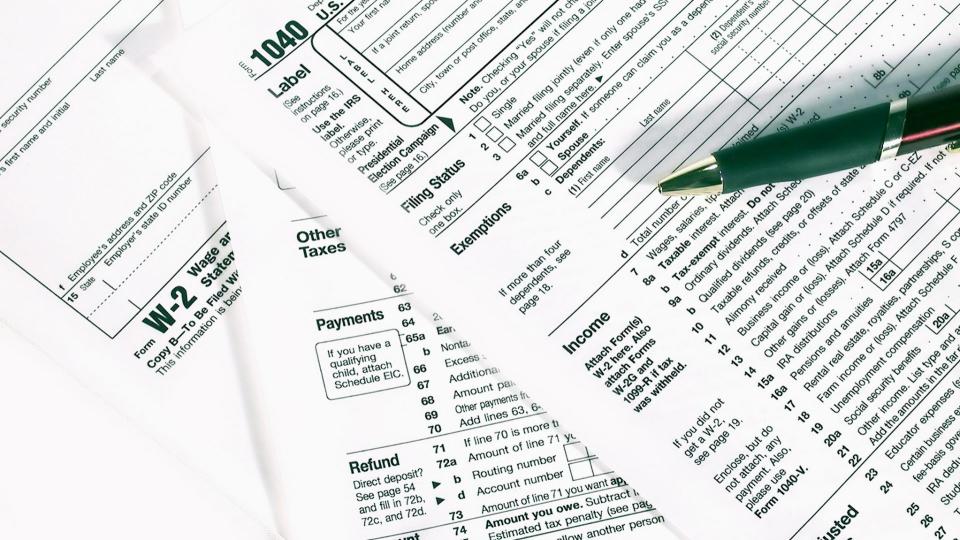Take the Quiz: Are You Filing Your Taxes Correctly?
Tax season can be daunting, even if you’ve filed on your own in the past. Not only can tax laws change from year to year, but there’s also plenty of false information out there about what income you have to report and what expenses you can deduct.
Find Out: Tax Year Deadline Dates You Need To Know
Even if you hate tax season, a little tax knowledge can go a long way toward boosting your refund.
Last updated: May 10, 2021

True or False: Itemizing deductions can shrink your refund.
True.If your itemized deductions don’t exceed the amount of your standard deduction, you’re better off giving up the former in favor of the latter. Your standard deduction is essentially a free write-off from the government, but you can give it up if you have larger itemized deductions.The amount of your standard deduction depends on your filing status. As of tax year 2020, the standard deduction is $12,400 if you’re single, $24,800 if you’re married filing jointly and $18,650 if you’re the head of household. So, whether you opt to itemize or claim the standard deduction will depend in part on your filing status.Itemized deductions include your home mortgage interest, state and local income taxes and sales taxes, real estate taxes, charitable giving and certain unreimbursed medical expenses and employee business expenses. It’s important to note that only medical expenses in excess of 7.5% of your adjusted gross income and employee business expenses in excess of 2% of adjusted gross income are tax deductible, and the deduction for state, local, sales and property taxes is limited to $10,000.For example, say you pay $10,000 in mortgage interest and $3,000 in state and local income taxes and donate $3,000 to charity, for a total of $16,000. If you’re single, it makes sense to itemize because your standard deduction is only $12,400. However, if you’re married, it doesn’t make sense to itemize for $16,000 in deductions because your standard deduction is $12,400.Do your research to ensure you’re getting the best possible deduction for your family.

True or False: If you earn enough to be in a higher bracket, the higher rate applies to all of your income.
False.As you ascend to higher income tax brackets, note that the greater tax rate only applies to income in the larger bracket. Tax brackets vary by filing status and are used to determine how much money you owe in income taxes.The federal income tax system is progressive, meaning as your income goes up, so does the tax rate you pay on additional wages. For example, for the 2020 tax year, if you’re single, you’ll pay 10% on the first $9,875 you earn, 12% on income between $9,875 and $40,125 and 22% on income between $40,125 and $85,525. So, if you make $37,950, you will pay 10% on the first $9,875 and 12% on the next $28,075.If your boss raises your salary to $42,125, the 22% tax rate will only apply to your last $2,000 of income, not the entire $42,125. So, don’t worry about getting hit with a sky-high tax bill.You should note that reaching a higher tax bracket could impact your long-term capital gains tax rate. The long-term capital gains rate applies to capital assets, such as stocks or property, that you’ve owned for more than a year. If your taxable income is $80,000 or less, you don’t pay taxes on your long-term gains. Above $80,000 in taxable income, you’ll generally pay 15% on your long-term capital gains. The rate jumps to 20% for taxable incomes of $441,450 for singles and $496,600 for joint filers.Related:These Are the Penalties You Face if You’re Late on Your Taxes

True or False: Every dollar of tax deductions equals a $1 reduction in taxes due.
False.Each dollar you deduct only reduces your tax bill by the amount of your marginal tax rate. Your marginal tax bracket refers to the tax rate you pay on your last dollar of income. For example, if your marginal tax rate is 22%, and you have a $1,000 deduction, multiply the amount of the deduction by your marginal rate to find the amount you will save, in this case $220.Additionally, the amount you save depends on whether the deduction is an adjustment to income or an itemized deduction. If you pay $1,000 in student loan interest, you get to claim that deduction whether you itemize or not. However, if you make a charitable donation of $1,000 and don’t itemize, you won’t get any reduction in your tax bill.Tax credits, on the other hand, do reduce your tax bill by $1 for every $1 of credit. However, it’s important to assess whether credits are refundable or nonrefundable. If you have a nonrefundable credit, your tax liability can’t be reduced below $0. But if you have a refundable credit, and it reduces your tax liability below zero, the IRS pays you.For example, say your tax liability for the year is $2,000, and you had $2,600 withheld from your paychecks. Under most circumstances, you would get a $600 refund. However, if you have a $3,000 nonrefundable credit, your tax liability would be reduced to $0 (the last $1,000 is essentially wasted), and you would receive a $2,600 refund. On the other hand, if that same credit were refundable, your tax liability would be reduced to negative $1,000, and you would receive a $3,600 refund.Don’t Forget: 8 New or Improved Tax Credits and Breaks for Your 2020 Return

True or False: If you get married on Dec. 31, you’re considered married for the entire year.
True.Believe it or not, the IRS determines your tax filing status on the last day of the year. So, if you say “I do” on Dec. 31, you’re considered married for the entire year.The same rules apply to getting divorced. If you’re divorced or legally separated prior to the end of the year, you can’t file as “married” for that tax year. And don’t try any funny business in an attempt to save a buck. If you get divorced during the year so that you can file as single, and then remarry the following year, you must file as married for both tax years.Additionally, if you have a child on or before Dec. 31, you can claim him or her as a dependent for the entire year. You need a Social Security number for every dependent you claim. If you don’t have one by the deadline, file Form 4868 to extend your filing deadline, but make sure to pay any taxes due on schedule.Related:10 Biggest Tax Problems for Married Couples

True or False: If you didn’t get a tax form, you don’t have to report the income.
False.While there are certain thresholds that trigger mandatory reporting to the IRS, individuals are responsible for reporting all income on their tax returns.For example, if you do freelance work, your employer isn’t required to send you a Form 1099-NEC unless you made at least $600. If you have interest income, your bank isn’t required to send a Form 1099-INT unless you made at least $10. However, you’re still required to report income that’s less than those amounts.You can’t enjoy those poker winnings without paying taxes on them, either. Though you typically need to win more than $600 before a casino will file a W-2G with the IRS, you must still report this influx.This tax rule also applies to income from bartering. The IRS doesn’t care whether you receive income in the form of cash or goods and services, so make sure to report it all faithfully.

True or False: You can deduct the value of time spent volunteering if you have a specialized skill.
False.There are several ways you can be rewarded for your charitable actions come tax season, but claiming a tax deduction for your time isn’t one of them. So, even if you have special training in construction, you can’t claim the value of your time as a deduction if you helped Habitat for Humanity build a home last yearYou can, however, deduct the cost of materials that you donated to assist with the project. For example, if you gave $500 worth of nails and boards in addition to your time, feel free to include that cost as part of your charitable donation deduction for the year.Further, you can deduct the cost of transportation to and from your charitable activities. If you don’t want to make those calculations, use the standard rate of 14 cents per mile.You’re also not allowed to deduct donations made directly to individuals — no matter how deserving — or nonqualified organizations. In other words, that donation to the food pantry might be tax deductible, but the cans of food you gave to a homeless woman in your neighborhood is not, even if the pantry turns around and gives the food to her directly.Read:How To Know If You Can Really Write Off That Donation

True or False: You don’t have to include your inheritance in your taxable income.
True — mostly.For most items you inherit, you don’t have to pay income tax because that money has already been paid. For example, if your grandfather leaves you a $50,000 bank account in his will, you don’t have to include that $50,000 as taxable income the year you inherit it.In addition, if you sell assets shortly after you inherit them, you’re likely to pay little in taxes. When you sell an asset, such as a stock, you only pay tax on the gain, or the amount you sold the item for minus what you paid for it. So, if you buya stock for $5,000 and sell it for $8,000, you have $3,000 of taxable income.In the case of inherited assets, the beneficiaries receive a step-up in the basis of the asset to the value as of the date of death. For example, say your uncle paid $1,000 for stock that was worth $10,000 when he died and left it to you. If he sold it the day before he passed, he would have paid taxes on $9,000 of income. But, if you sell it for $10,000 the day after he died, you won’t have any taxable income, because your basis is now $10,000; in other words, you have no gain.There is one significant exception: items that are considered income in respect of a decedent, or IRD. Income that would have been taxable to the decedent he had lived, IRD items include inherited IRAs and 401k plans, but you don’t pay taxes on the money until you receive distributions — just like the decedent would have.For example, if you inherit a $50,000 traditional IRA, you won’t pay taxes on it immediately. But if youwithdraw $1,000 from a traditional IRAbecause you’re taking a required minimum distribution, you have to include that as part of your taxable income.Up Next:10 Tax Loopholes That Could Save You Thousands

True or false: Unemployment benefits are taxable
True. The coronavirus pandemic that started in 2020 forced a lot of Americans into unemployment. At one point, the unemployment rate peaked at an unfathomable 14.8%, a rate not seen since data began being collected in 1948.Since these unemployment payments were a lifeline for so many Americans, it doesn’t seem as if those would be taxable. After all, the stimulus payments sent out in 2020 and 2021 served a similar purpose but were deemed nontaxable. Yet, the truth is that unemployment compensation has always been taxable, and that remains true for tax year 2020.

True or false: You don't owe income tax on premature retirement plan withdrawals you took in 2020
False. The confusion around this tax issue is due to a special exception made for premature retirement plan withdrawals in 2020 due to the pandemic. The CARES Act granted permission for individuals in need to withdraw up to $100,000 from their retirement plans in 2020 without having to pay the typical 10% early withdrawal penalty for those under age 59 1/2. However, those distributions are still deemed taxable income.Due to the provisions of the CARES Act, you can pay the tax on any such distributions over three years. This means you can pay in installments when you file your taxes in 2021, 2022 and 2023, or you can pay the full amount owed whenever you would like.More From GOBankingRatesDon’t Miss Out on Nominating Your Favorite Small Business To Be Featured on GOBankingRates — Ends May 31
Money’s Most Influential: Where Do Americans Get Their Financial Advice?
‘Rich Dad Poor Dad’ Author Robert Kiyosaki: You Should Never Say ‘I Can’t Afford That’
Everything You Need To Know About Taxes This Year
John Csiszar contributed to the reporting for this article.
This article originally appeared on GOBankingRates.com: Take the Quiz: Are You Filing Your Taxes Correctly?

